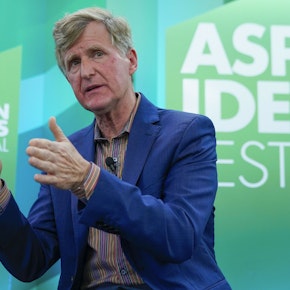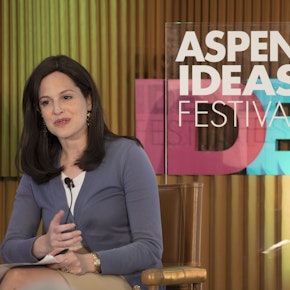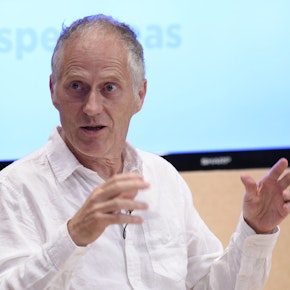Explore
Search results

Economic uncertainty continues its reign of confusion, vexing financial leaders, regulators, and consumers with worrisome inflation and unpredictable markets. Experts weigh in on whether we can avoid a recession, what today’s banking and political difficulties signal about the future of lending and saving, and how workplace developments, A.I. advances, and complex geopolit...

How do we sustain growth in a volatile and rapidly changing economy? What’s the best way to foster productivity and fulfillment at work? How will A.I. change the job market? Can we avoid a recession? And how can we allow everyone a fair chance at economic prosperity and upward mobility?

If you’ve ever taken a yoga class or learned a new recipe on YouTube, you have helped fuel the creator economy: the hundreds of thousands of creative people who make their living teaching, guiding, and entertaining the rest of us. During this session, YouTube Chief Business Officer Robert Kyncl will discuss the rise of the creator economy and finding success online with tw...

America’s heartland is quietly upending traditional notions of how cities work to deliver on their promise of shared prosperity. This means local governments, philanthropy, and the private sector have to work together and work differently. Jennifer Bradley of the Center for Urban Innovation and Rip Rapson of the Kresge Foundation discuss how leaders from Detroit, Fresno, M...

As the world continues to grow, there are more mouths to feed. With emerging markets, biotechnology in the agricultural sector contributes to market stability and aids in providing the resources necessary to continue economic growth in the developing world. On every continent, these shifts are apparent and farmers and the agribusiness are striving to adapt accordingly. Fro...


Job loss from automation is not inevitable. It is a choice. The fundamental technology design pattern is that economic activity increases and jobs grow when you use technology to do more, rather than just to cut costs. What is the nature of the “more” we should be doing? What are the policies that might encourage it? What is the future shape of the economy that we already...


What are the best solutions for dealing with the increasingly dire North Korea situation?


Tim O’Reilly says we should be harnessing technology, rather than fearing it.

Two-thirds of American workers do not have a four-year college degree. In an increasingly tech-driven economy, how can we ensure that a lack of higher education isn’t a roadblock for this huge part of the population and, likewise, that talent shortages aren’t barriers to business and economic growth? What are the most innovative ways to upskill, reskill, or next-skill work...

Three experts discuss how science and technology are impacting Israel’s economy and security. This session will examine recent breakthroughs in quantum science in a way that is understandable to those without a background in the topic. In what ways are these recent discoveries promising, and what are the challenges that lie ahead? How powerful of an impact could they have...

Even if we stopped emitting carbon tomorrow, trillions of tons would remain in our atmosphere, causing climate change for generations. While natural, agricultural drawdown techniques are being deployed, high-tech carbon capture tools are getting major buzz in the environmental movement. From direct air capture to retrofitting power plants, what are the most promising solut...

E.O. Wilson said, “We have Paleolithic emotions, medieval institutions, and godlike technology.” How should technology be designed and controlled so it improves our lives, economy, and culture without losing individuality, privacy, and trust in society and each other? Presented by Allstate

The recent frenzy around NFTs and cryptocurrency have thrust blockchain into the spotlight. But is the true promise of the technology more profound? Joe Lubin, co-creator of Ethereum and one of the original pioneers in blockchain, joins Financial Times’ Gillian Tett to discuss the state of cryptocurrency and the implications of decentralization for the global economy.

Silicon Valley is notoriously a boys’ club, perhaps to society’s detriment. What effects do discrimination and inequality in this sector have on our culture, society, and economy? What happens to technology when the executives, engineers, and designers who produce it are mostly male? Who are our most powerful advocates for diversity in the tech industry, and how are they f...

The advent of NFTs as a means of selling artwork raises many questions about creative practice and the marketplace. Do NFTs as a category of collectables work in tandem with or replace three-dimensional art objects? What does it mean for traditional gatekeepers of artistic value, including art dealers and museum curators, to be faced with a new means of conveying work from...

In the age of big data and the rise of the digital economy, no government agency plays a more central — or less understood — role than the mysterious National Security Agency. For years, the so-called Puzzle Palace was so secret that officials joked its acronym stood for “No Such Agency,” — until Edward Snowden published many of its biggest secrets online. Hear one of the...

Facebook holds more power globally than do few other private or public-sector entities. So, hearing from one of its top execs often sheds light on what to expect. The company’s chief product officer, Chris Cox, joins The Atlantic CEO Nicholas Thompson to discuss a wide range of issues regarding the ever-evolving creative economy. What’s the role of virtual reality in the y...

By 2055, it is estimated that 50 percent of today’s work activities will be automated. This means that some work will be automated within certain professions, while other professions may completely cease to exist. It means a glaring need for new jobs and a new conception of “work.” It means reorganized industries and reorganized landscapes. What else does it mean? Which jo...


What will define the next decade?







